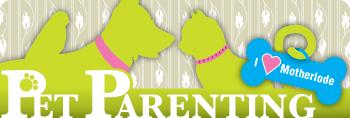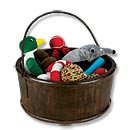
We know some of the Motherlode mamas love their animal babies, too. That’s why we have Pet Parenting. Local pet behavior counselor Denise Holmes, who owns Ain’t Misbehavin’, answers our most pressing pet questions in this feature. Denise has been training animals for 25 years and loves working with furry friends. She’d also love to answer one of your questions, so send it in!
Now on to a question that many of you deal with on a daily basis:
Q: My preschooler is hard on our poor dog. I work hard to keep both of them safe, but it seems like every time I look up, my son is chasing the dog around or laying on her. The dog is good-natured, but I’m afraid she’ll have enough sometime soon. Any advice?
 A: I’m glad to see this question being asked and applaud your recognition of a potential problem. Yay Mom! My suggestion is two-fold. First, make sure your dog has a place to go where he can escape and be alone. A crate, a room, anyplace that is inaccessible to your child. Let your dog know this is a good place to be, by providing him something pleasant to do in this space such as a hollow toy or a chew.
A: I’m glad to see this question being asked and applaud your recognition of a potential problem. Yay Mom! My suggestion is two-fold. First, make sure your dog has a place to go where he can escape and be alone. A crate, a room, anyplace that is inaccessible to your child. Let your dog know this is a good place to be, by providing him something pleasant to do in this space such as a hollow toy or a chew.
Second, if your child is a preschooler, he isn’t too young to begin learning some ‘dog etiquette.’ Begin by talking about personal space, and how your dog expresses his feelings with a certain look, twitch of the ear or tilt of the head. Dogs are VERY good at non-verbal communication and you can help your preschooler begin to recognize what your dog is trying to say by pointing out these things.
 Next, help your preschooler and your dog by teaching them some appropriate activities they can do together. Fetch is a great burner of energy for both dogs and little boys. Your son can also help with training by giving sit commands, clicking, or teaching the dog a trick such as shake, and rewarding the behavior.
Next, help your preschooler and your dog by teaching them some appropriate activities they can do together. Fetch is a great burner of energy for both dogs and little boys. Your son can also help with training by giving sit commands, clicking, or teaching the dog a trick such as shake, and rewarding the behavior.
By teaching a fun activity they can do together and teaching your son how to recognize what your dog is communicating, you are teaching them both how to play and get along, as well as potentially preventing any accidents. If you think you may need professional help, don’t hesitate to contact a trainer who is experienced in working with children and dogs.
For Denise’s professional help in training your pet, call her at 479-225-6063 or visit her website for more information (link).
